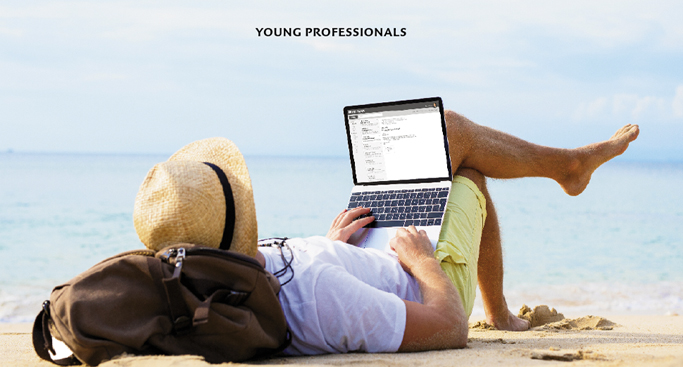Young Professionals
WORKCATIONS
By Christopher W. Cook

The other day (a phrase in my vocabulary that means any time within the past decade or so) I saw an article with the word “workcation” in its title. This word was unfamiliar to me. I understood the “work” part and the suffix “cation” reminded me of vacation, but the idea of working during a vacation seemed bizarre to me. But then I read the article.
The article, released as part of a passport-photo.online blog, shared the results of a recent survey conducted by the group that discussed the blending of work and play by combining the ideas of working remotely while on location like a vacation. This concept sounds fitting when looking at trends of Generations Y (Millennials) and Z.
According to The Deloitte Global 2022 Gen-Z & Millennial Survey, 75% of Gen-Z and 76% of Millennials would prefer a hybrid or remote working pattern. Those who had worked in such an arrangement cited benefits like freeing up time to do other things, more time to see family, a positive impact on mental health, and saving money (lack of a commute).
The survey said that “[g]iving people the flexibility to work where and when they want is a critical starting point to address inequities in the workplace and enable better work/life balance.”
Afterall, when it comes to work/life balance, according to the survey, 46% of Gen-Z and 38% of Millennials stated that they are stressed “all or most of the time,” with 39% of Gen-Z and 30% of Millennials contributing “concerns about my mental health” as reasons for that stress.
Workcation stats
Compared to workers in countries in Europe, who may get upwards of 20 to even 30 days of PTO a year, the average American worker receives only 10 days, so it may come as no surprise that a blending of work and play is a growing desire, especially after the COVID pandemic showed that hybrid schedules were possible.
The survey shared the results of 1,000-plus Americans who, having the flexibility to take their workloads elsewhere, took a workcation during the end of 2020 or during 2021. It showed that the purpose of this time away from the office was for:
- Recharging mentally and emotionally (67%)
- Avoiding feeling stuck in one place (62%)
- Exploring a new destination without having to use vacation time (60%)
- Escaping the routine and enjoying a change of scenery (57%)
- Meeting new friends, business contacts, or love interests (42%)
- Preventing or coping with burnout (18%)
Eighty-two percent of the workers opted for a domestic trip (53% of these traveled to a different city in their own state and 47% went to a different state),while 18% traveled internationally.
When on their workcation, nearly three-fourths stayed with either family or friends or at a hotel (43% and 31% respectively). The length of the trips varied, but 36% stayed between one and two weeks, 32% between three and four weeks, and 13% over a month. Ten percent did less than a week, while 9% did two months or more.
When choosing their accommodation, the following were important:
- Reliable internet (65%)
- Health and safety standards (63%)
- Online ratings and reviews (63%)
- Suitable space to work (63%)
- Price (52%)
- Flexibility to cancel without penalty (50%)
- Proximity to attractions (28%)
- Presence of a quiet room for meetings (15%)
So, were they worth it? According to the results, 88% of respondents had a positive or very positive reaction, with around 2% having a negative or very negative response; 10% were neutral. Following up with participants after the conclusion of the survey, when asked if they would take another workcation in the future, 94% responded yes.

Challenges and expenses
Even with a high percentage considering a future trip, there are things to consider—and even some negative aspects from the experiences, as seen in the results.
When it came to expenses, the largest sums went toward: food and drinks (82%), transportation (72%), housing (66%), entertainment (64%), and sightseeing (24%).
A surprising statistic that caught my attention was that 56% of the participants said the experience had a negative impact on their work-life balance. Other challenges included:
- High cost of living (71%)
- Visa and/or work permit issues (54%)
- Tax implications (51%)
- Time-zone differences harming communications (48%)
- Loneliness (18%)
It’s important to remember the separation between the words vacation and workcation. Despite the exotic location, you still should be expected to put in the time required to get your workload done. Expedia’s most recent Vacation Deprivation study showed that 61% of its participants did not consider a workcation to be a “true” vacation, while 78% enjoy feeling “unproductive” during their time away—but at the same time, nearly 50% bring along their work laptops regardless.
Conclusion
The passport-photo.online survey did reveal benefits of workcations, including:
- 86% agreed or strongly agreed that it boosted their productivity
- 83% agreed or strongly agreed that it helped them cope with burnout
- Around 84% found that they were more satisfied with their job
- Nearly 69% claimed they are now less likely to leave their job
While 56% of the U.S. workforce can work remotely—according to stats on workcation.com—and with employers struggling to retain workers during the Great Resignation, the workcation may be something to consider for your agency or brokerage. Look at the pros and cons and bring the idea up to your leaders. Maybe you’ll be dipping your toes in the sand when you send that next email.






